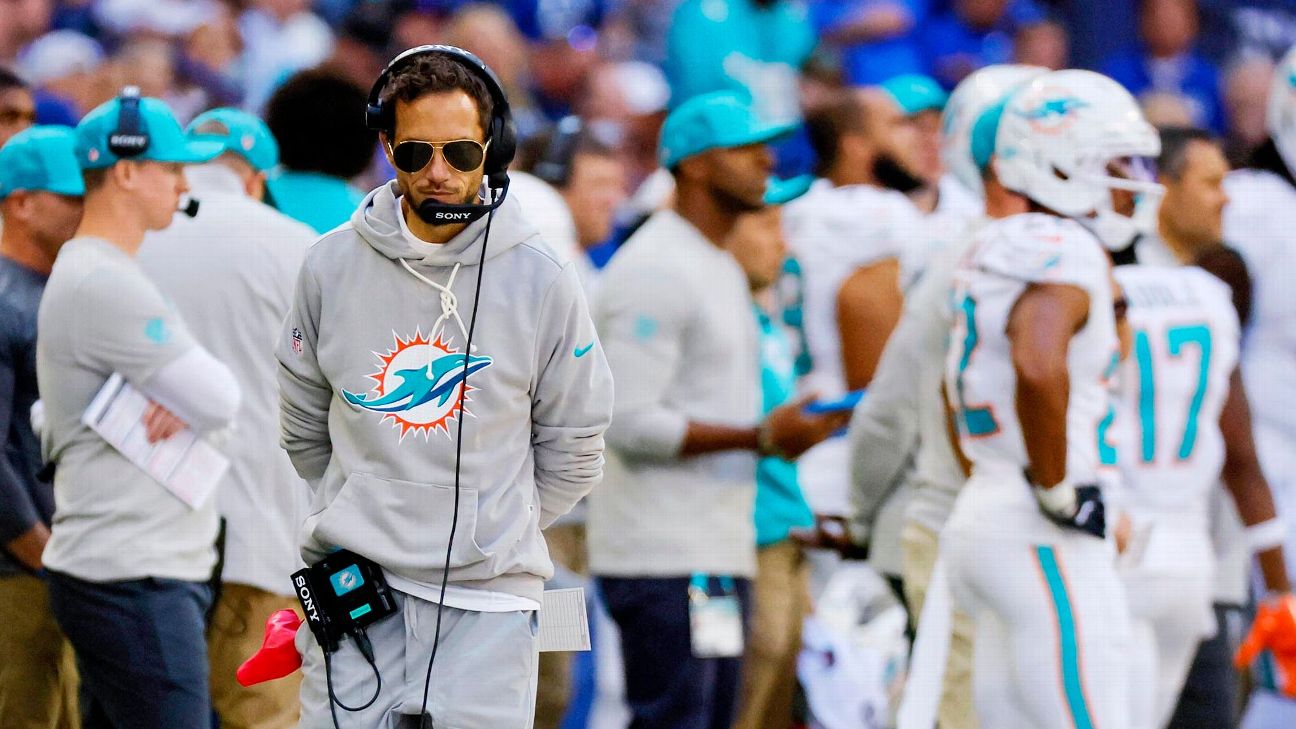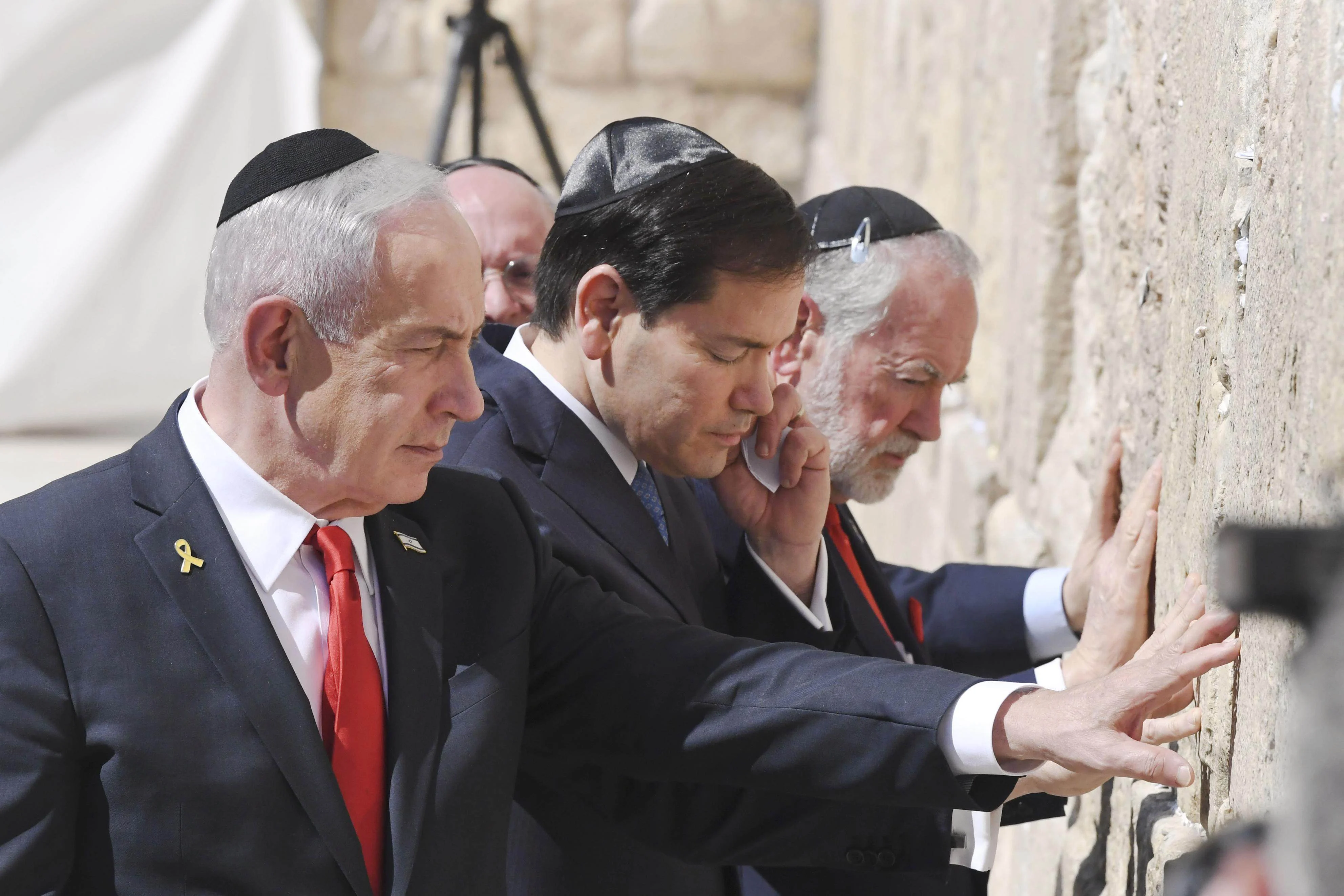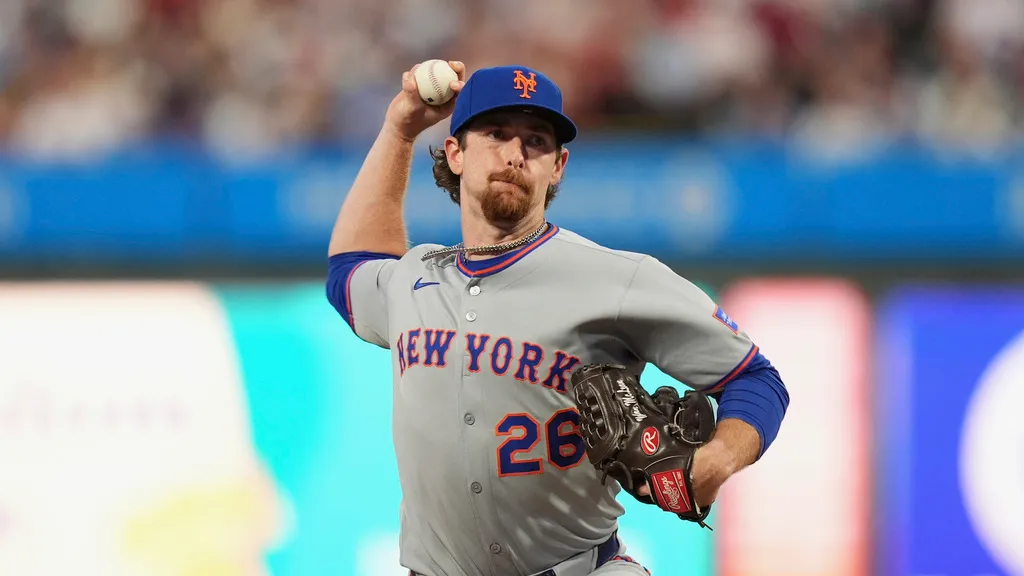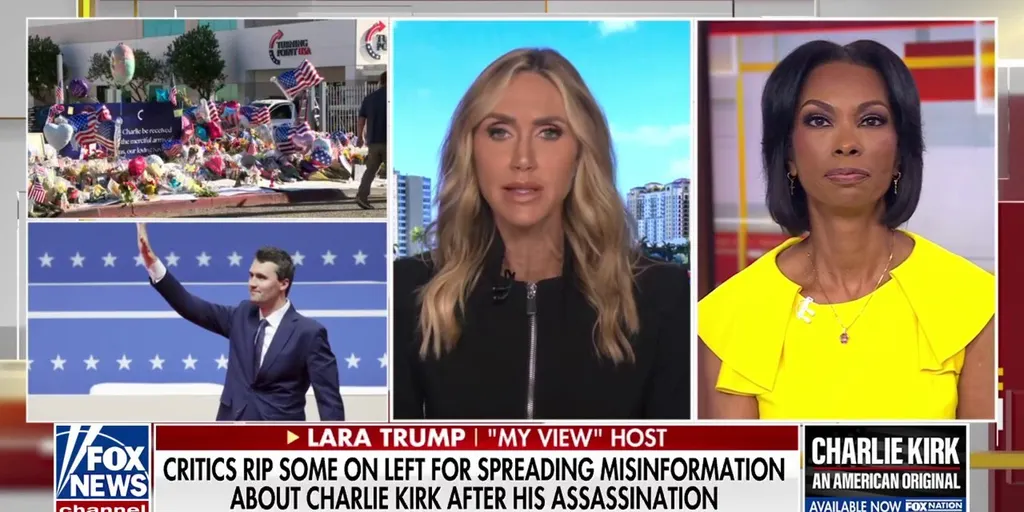By Marcel Louis-Jacques
Copyright espn

MIAMI GARDENS, Fla. — A fight between two Miami Dolphins players during a sweltering August joint practice session with the Chicago Bears might have looked like a team tearing itself apart. But for people within the organization, it was one of the first positive signs that an important change had taken hold among the team.
During team drills, linebacker Jordyn Brooks took exception with teammate and fellow linebacker Tyrel Dodson for not, in Brooks’ view, being physical enough with a Bears offensive player during a particular rep. Ultimately, both players had to be separated as tempers flared.
Afterward, Brooks and Dodson apologized to Dolphins teammates and coach Mike McDaniel for the scuffle. They later gave a joint interview in the locker room after the teams’ preseason game that weekend, downplaying the incident as an argument between brothers, but the clash was seen within the team as a resounding example of players taking pride in a new standard of accountability the franchise had tried to instill this offseason.
“Honestly in Chicago, with [Brooks and Dodson] — [it was] players holding players accountable,” linebacker Bradley Chubb told ESPN. “We were in the heat of battle, so it got a little bit more heated than it should have. … Just guys getting in each other’s face, but at the end of the day, knowing it’s all love and this is about pushing each other to be the best.
“It was probably the biggest turning point for our defense this offseason because we saw two alphas going at it and pushing each other to be better.”
Since their disappointing 2024 season ended, the Dolphins — according to multiple current and former players, coaches and team officials — have sought to improve the culture inside their building. The team has reinforced the importance of accountability and jettisoned players who decision-makers in the organization believed weren’t conducive to the team’s success, while bringing in those they thought would buy in and put team over self. Included in those moves was trading away one of its best players in Jalen Ramsey this summer. Among other measures taken to turn the culture around were offseason three-a-day workouts, voluntary wind sprints at practice and an early-season players-only meeting.
Throughout the offseason, players and coaches spoke to their new standard being upheld and the re-emphasized importance team leaders — including player captains, coach McDaniel and general manager Chris Grier — have placed on relationship building. This, they hoped, would help the franchise contend for a Super Bowl a year after missing the playoffs for the first time in McDaniel’s three seasons in charge.
But two weeks into the 2025 season, and after back-to-back losses to the Indianapolis Colts and New England Patriots, the resolve Miami believes it has instilled is being tested as it enters a critical game against the Buffalo Bills on Thursday (8:15 p.m. ET, Prime Video).
The Dolphins’ defense, which was scrutinized this summer after replacing its entire secondary from a season ago, allowed opponents to score on 13 of their first 15 drives to start the season. In their season opener, the Dolphins’ offense recorded just 211 yards — their fewest under McDaniel in a game when quarterback Tua Tagovailoa starts.
The Dolphins are 8-11 since the start of the 2024 season, despite having some of the league’s highest-paid skill position players, and injuries have plagued a pass rush in which Miami has invested multiple first-round picks. Some fans have made clear their desire for both McDaniel and Grier to be fired, even taking to the skies before Sunday’s game.
Players and coaches believe the Dolphins’ culture has changed — or at least, has matured. But Grier acknowledged that words have little value without action behind them, and Miami’s 0-2 start leaves it at a crossroads: Down one path, the improved culture within the building catches on and the team rebounds to a successful season. Down the other, the Dolphins’ 25-year drought without a playoff win will extend and force team owner Stephen Ross into difficult decisions about who is running his franchise.
“We can say all the stuff has changed, and words and everything,” Grier said in August. “It doesn’t really matter; we have to go do it on the field and win games. It’s just the simple way of saying we can say how good we feel, and everything is going, but until we win games and do it on the field it doesn’t matter.”
IN THEIR FINAL team meeting of the 2024 season, shortly after a season-ending loss on Jan. 5 to the New York Jets, McDaniel issued a challenge to his players.
According to multiple players and team staff, the Dolphins coach stressed the importance of player-driven accountability and said that anyone who wasn’t on board could say so, and the team would either trade or release them.
Players repackaged his message to local media later that day during locker room cleanout. Defensive tackle Zach Sieler, a team captain and team leader, told reporters that players needed to hold themselves to a higher standard.
“Absolutely, yep, I think so,” Sieler said in January. “And I think what McDaniel does a great job of is preaching the player locker room and I think it needs to come from us as players and leaders and captains as well as the staff and get everyone here and get everyone working together from Day 1 in OTAs and camp and get things taken care of from Day 1, and take care of business to start fast next year.”
Multiple sources in and around the team said tardiness was an issue throughout this past season. McDaniel told reporters in his end-of-season news conference that fining players “didn’t particularly move the needle,” and said “bringing it up as a team and continuing to fine guys wasn’t enough.”
One current Dolphins player said he believed some captains this past season took advantage of the role. Ramsey and wide receiver Tyreek Hill, who were two of the eight players voted captains in 2024, were among repeat offenders who received numerous fines throughout the season.
Players were often late to practice and meetings, with multiple team sources suggesting it reflected a lack of respect for the first-time coach McDaniel — who was hesitant to publicly admonish players outside of posting fines.
However, one former Dolphins player who played for McDaniel in Miami said that behavior wasn’t exclusive to the 2024 season and issues only arose when the team stopped winning games.
In 2024, Miami rebounded from a 2-6 start to finish the season 8-9.
“Everyone was fine with cutting meetings, cutting practice when they’re winning, but once you’re losing, it’s like now you can’t get mad at that,” the player said. “You were just enjoying it when you were winning.”
As losses mounted this past season, players were called out for tardiness or absence — which the former player said added to some players’ frustrations. That frustration boiled over when Hill removed himself from the team’s season finale loss to the Jets.
After that Jets game, McDaniel told reporters he was informed Hill was not available and that his absence wasn’t injury related. In the locker room, Hill, who was in the first season of a three-year, $90 million extension he signed in August, hinted at a potential exit from Miami.
“I just have to do what’s best for me and my family — if that’s here or wherever the case may be,” he said in January. “I’m about to open up that door for myself. … I’m out, bruh. It was great playing here but at the end of the day, I have to do what’s best for my career.
“I’m too much of a competitor to just be out there.”
Former Dolphins running back Raheem Mostert said during an appearance on the “Stugotz and Company” podcast earlier this month that he understood why Hill pulled himself from the game amid one of the worst statistical seasons of his career, although it’s something Mostert himself said he would never do.
Hill apologized publicly in February to both the team and Tagovailoa — who did not play in the Week 18 game — and ultimately conveyed to the team he still wanted to be a part of it after the season, although Tagovailoa said in July that their relationship required repair.
When asked last week, Hill told ESPN that he doesn’t believe he received preferential treatment and insisted on his high-caliber work ethic — but did not deny missing meetings or arriving late to meetings and practice.
Hill told ESPN he has not missed any meetings this season, dating back to the offseason, and has been on time to “everything.”
Ramsey’s behavior, meanwhile, became a drain on team morale, according to multiple sources, including current and former players, who said his actions varied from being late to team activities to outright leaving practice.
Grier spoke publicly in April, saying the team and Ramsey mutually agreed to seek a trade — but a source within the organization said the decision was team driven.
Miami eventually traded him and tight end Jonnu Smith to the Pittsburgh Steelers in exchange for defensive back Minkah Fitzpatrick in June. Ramsey and his agent, David Mulugheta, did not respond to multiple attempts to obtain a comment.
Miami also refrained from making high-capital additions this offseason, bringing in players on modest deals while signing Sieler to a three-year, $63 million extension.
Grier said in August the Dolphins’ roster moves this offseason — like allowing homegrown safety Jevon Holland to leave in free agency and releasing veterans such as Mostert, Kendall Fuller and Durham Smythe — were an effort to financially reset, but also hinted at needing to move forward with “the right guys” on the roster.
“When you bring in so many new players that have been stars that played other places and you kind of work through it, you have your expectations, but you’re winning,” Grier said. “But you look at it and you’re like, ‘Hey, I don’t know if we’re winning the right way.’ You know what I mean? That’s kind of what it was. We had a lot of good guys in that locker room, as you know, some of the guys that are leaders were here before as well. They were held accountable, but at times guys, it didn’t matter to them.
“Moving on from those people with the right guys here and focusing on that, because when you have a year like we did last year, we had gone to the playoffs the two previous years, and at some point you say, ‘OK. All right, enough is enough.'”
THROUGHOUT THE SUMMER, Dolphins players stressed the importance of establishing their new standard — which included one-upping each other in offseason workouts away from the facility.
“Since the season ended last year, I’ve spent a lot of time with [left tackle] Pat [Paul]. So our grind, his mentality, his work, doing two-a-days, three-a-days, stuff like that, it’s different,” Dolphins center Aaron Brewer said.
“He’s doing it, so I’m trying to do the same thing to keep each other on the same level. Hold each other accountable.”
On the field, players were seen running wind sprints during and after practice.
“It’s something we as the players decided,” Dolphins tackle Austin Jackson said. “If we have pre-snap penalties, we’re going to punish ourselves for that. Things that are in our controllables — that’s what we call that. Pre-snap penalties, we can control that, so if you make the mistake in practice, we’re going to self-correct ourselves with a little disciplinary action.”
Player-driven leadership has always been emphasized under McDaniel, who began his Miami tenure 20-14 with two playoff appearances. His style, as one current player described it, is laid back without being hands off.
The former Dolphins player who played for McDaniel said the coach was always “open and vulnerable” with his players, which he thinks players misconstrued as being “soft.”
“Some people like having someone that’s going to keep them accountable,” he said. “Some people like having that hard-nosed guy as a head coach — but Mike was always open with the guys, always vulnerable. … I personally take it as being a person, you’re being human. … But some people just don’t respect that and that’s on them.
“I personally don’t think that you need your coach to rile you up, to be hovering over you for you to do your job — because we’re not in high school anymore. We’ve got to take care of our own business. I don’t care if Tyreek gets special treatment or not, because that doesn’t affect me. What affects me is what I do, what I go out there and do.”
McDaniel said Tuesday he hasn’t issued any fines for lateness or attendance since the end of this past season, outside of an “alarm clock issue in Week 2 of training camp.” He said, “be on time” is the third team rule, behind “protect the team” and “no excuses” and players have adhered to it this season.
“You acknowledge and attack a problem for a solution and all you can ask for is that this team hasn’t been a victim of that,” he said.
McDaniel hasn’t changed his leadership style this year — although the team source told ESPN that he has been more willing to call out players, starting with the team’s captains.
After the Dolphins’ 33-8 Week 1 loss to the Colts, McDaniel told the media that Tagovailoa’s play “left something to be desired.” Tagovailoa completed 14-of-23 passes in the loss for 114 yards, one touchdown and two interceptions. His 2.7 QBR was the worst of any career start that he did not leave with an injury, and the worst performance among all quarterbacks that week.
McDaniel also mentioned Sieler as a player who abandoned his assignment, which led to an explosive play for the Colts.
Dolphins players met Sept. 9 following the Indianapolis loss to make sure the result didn’t snowball, although the players-only meeting didn’t prevent a 33-27 loss to New England in Week 2.
Brooks said McDaniel relies on the team’s captains to keep a handle on locker room morale.
“I mean, it’s player-led, but he’s still the head coach,” Brooks said. “So, it’s not so much the players are just running the team and setting things. I think he kind of relies on us for moments like this. We go out there and get whooped, like ‘Oh, we got to gather the troops.’
“This is where the leaders come in, making sure that everybody’s locked in, making sure that your team is still committed … that’s what I think what he means player led. He’s still the head coach, you know what I mean? If he wants something to go that way, it’s going to go that way.”
One former Dolphins player, who spent the previous two seasons with the team under McDaniel, said the issues plaguing Miami don’t stem from a poor culture.
“I think it’s schematic and personnel-wise that’s more of the problem than the culture,” the player said. “They’ve had the same culture for the years they were winning as they did the one down year.”
In the loss to New England, Miami committed two pre-snap penalties on a potential winning drive before ultimately turning the ball over on downs. After the game, McDaniel and Tagovailoa each expressed frustration over the team’s level of communication, with McDaniel saying his assistant coaches “did not execute … in a very dire period of the game.”
Tagovailoa said he would take some initiative to clean up an ongoing issue for Miami; its offense was also flagged for having too many men in the huddle on a 2-point conversion attempt in Week 1.
“I’m going to go have a conversation with Mike. I’m going to go have a conversation with [quarterbacks coach Darrell Bevell], with our offensive guys and talk about it because what we put out there,” Tagovailoa said. “Anyone who knows football and anyone who doesn’t know football just knows that was not clean and that was not right, what we were doing at the end of the game.
“We’ll get that fixed, communicate that to those guys, and we’ll move forward from there.”
HIGH ABOVE HARD Rock Stadium prior to the Dolphins’ loss to the Patriots on Sunday, a small aircraft flew a banner behind it with an unmistakable message:
“FIRE GRIER. FIRE MCDANIEL.”
It didn’t outwardly bother McDaniel.
“Fans want their team to win. … I don’t think it’s personal,” he said. “I think they want to win. And so do I.”
Ross issued a statement hours after the 2024 season ended, committing to McDaniel as the Dolphins’ coach and Grier as their general manager — with an important caveat.
“I believe in the value of stability,” Ross said. “However, continuity in leadership is not to be confused with an acceptance that status quo is good enough.”
A source familiar with Ross’ thinking told ESPN this offseason they don’t believe McDaniel’s and Grier’s job security is as simple as “playoffs or bust,” and reiterated that sentiment after Week 1. Grier said in January that Ross hadn’t issued any ultimatum to either of them. McDaniel said Monday that his conversations with Ross haven’t changed despite Sunday’s loss to the Patriots.
According to the aforementioned team source, Ross’ status quo comment pertained more to the process than the results — although there is a limit to his patience with the team’s results. After a winless start to the 2025 season, and prime-time games against division opponents coming, there will be increased outside attention on how far Ross’ patience will stretch.
Even as the losses continued, McDaniel said this week he isn’t worried about losing his job.
“I think if I worry about my job security, I won’t be doing my job — and I think that inherently is against all things that I believe in,” McDaniel said following the Week 2 loss to New England. “I’ve never felt entitled to this position and it’s very important for me to spend all my waking hours worrying about exactly how to do my job.
“I won’t spend one moment thinking about all the things that, whatever people want me to think about. [I’m] thinking about this team and the Buffalo Bills here, after I get done with this podium.”
In light of all their efforts to change things, the Dolphins’ players and coaches acknowledge the team is still finding its identity.
McDaniel, specifically, believes how his team responds to said adversity is what will ultimately define it.
“I feel like we have a unified locker room and a unified team; it’s one of those things that failure provides an opportunity to see that with transparency. It’s not as gray as everybody going in the same direction.
“A lot of times when you experience collective failure, you lose a game or two games, you get to see exactly what type of culture you have based upon how people respond. That’s one of the reasons I focus on response so much because to me that’s all really life is, and teams are and cultures are.”



